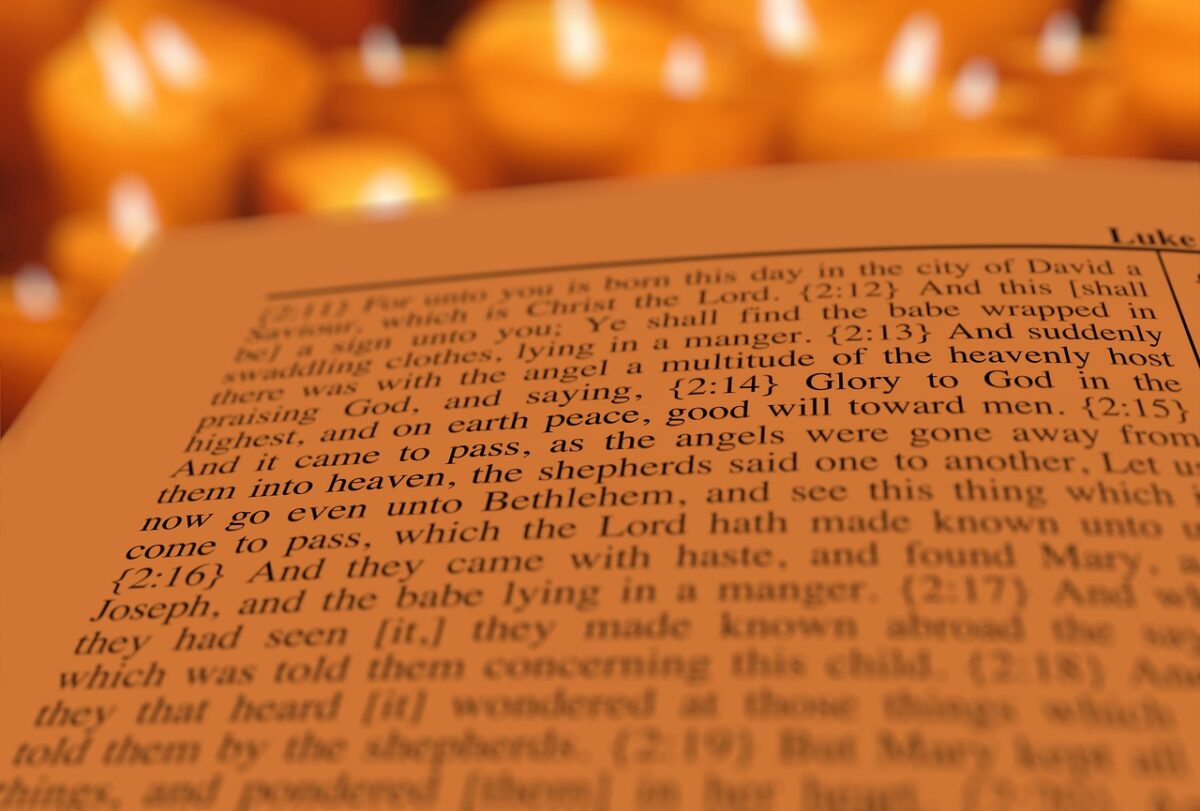“Behold, a virgin shall be with child, and shall bring forth a son, and they shall call his name Emmanuel, which being interpreted is, God with us.” Matthew 1:23
As we all celebrate another Christmas season it is well for us to ask, “How did it come to be?” “What is the meaning of it all?” “What is its purpose?”
The human tendency always is to forget origins. And now that Christmas has grown to be such a great festival, almost universally observed, and of vast commercial significance, there is still greater danger of our forgetting the real meaning of it and thereby eventually losing its sweetness and holy purpose.
But in the name “Emmanuel,” we have clearly stated, and yet so simply, the vast and stupendous issues involved in the birth of the little Child in the manger at Bethlehem. Surely the birth of another child, the birth of a mere ordinary man, great though he might prove to be, could never have wrought such a change in the ordinary routine life of this and many other nations, a change so great that for weeks millions of people turn their thoughts away from self and think of others.
What is there in the birth of this Child that is able to work such mighty changes in the affairs of men and after the lapse of two thousand years? What is it that takes the gray days of winter and turns them, with all their burden of sorrows, into the happiest days that we ever know? What is it that breaks the ever cumulative monotony of our treadmill existence and makes us children again, and fills every home with laughter and gaiety? What is it that causes to break forth from every lordly fane and rustic church and home and school, and to sound out on frosty air from steeple to steeple, those age-old hymns and spiritual songs that we never tire to sing? “We hear within the solemn sound, of her unending song.”
This No Ordinary Babe
It must be more than the birth of another little babe, beautiful as that may be. And indeed it is! It is the birth of God Himself in human form. It is the stooping of the Divine and the Almighty to make Himself plain and known to our finiteness. No wonder such an amazing event, such a world-shaking fact, changes our order of life and brings new hope where hope seemed dead.
And this great fact is made known to us by the name Emmanuel, which simply means, “God with us,” that God has come and dwelt among men. Still of all the names of Jesus, this is perhaps the one we use the least. Emmanuel, God with us. Can it be that the loss of this great name from our vocabulary means the loss of the chief meaning of Christmas? We trust not.
Just think what there is in a name! And to the ancient Hebrew there was far more than there is to us today. They did not give a name lightly. It stood for the character and the purpose of a man. But this name was a divine gift. It was imposed upon the Child at His birth, and was intended to convey to men the meaning of His mission here upon earth. Did later events in His earthly life, in His never-ending sway over the hearts of men, prove that the name was ill-advised or attained under false pretensions? They did not. But rather by His mighty works, His wonderful words, the way He died, the way He rose again and conquered death, the way He rules the world, all these prove that “He was to the manner born”—that He rightfully bore the name Emmanuel, “which being interpreted is, God with us.” Let us consider its meaning and contemplate its rich significance.
The Need for a Deliverer
1. The meaning of Emmanuel is an answer to human need.
How great was that need! The world had grown old with its burden of sin. This is no mere theological dogma. Any openminded reader of secular history knows that if ever a deliverer from human misery were needed, it was at that very time when Emmanuel came. The nations that had boasted of the culture of ancient civilization had become corrupt and were rotten from the top down. The flower of these races and the chief ethical teachers of the day were the greatest cynics and did not deny their addiction to the bestial sins of the age.
This is one of the reasons why the birth of the Christ Child was said to take place, “when the fullness of time had come.” Man had reached the low depths of depravity and helplessness, where it was patent to all that he was incapable of entering into fellowship with, of even knowing, of being able to see or understand, such a Being as the pure and holy God, a God without bodily form, who is a Spirit and must be worshiped in spirit and in truth. This was the reason why Jesus later said, “O righteous Father, the world hath not known Thee; but I have known Thee, and these have known that Thou hast sent Me” (John 17:25).
And so Emmanuel means that God took pity on our inability and came and dwelt among us, so that we might feel and know that He was near us and was one of us. All earnest men have a longing to see God. Moses expressed this longing and was granted a partial vision. Philip made the same request when he said to Jesus, “Lord, show us the Father, and it sufficeth us.” But Jesus answered him and said, “Have I been so long with you, and yet hast thou not known Me, Philip? He that hath seen Me hath seen the Father; and how sayest thou then, Show us the Father?” (John 14:8, 9).
The Reverence of the Birth
What a reverence indeed it casts about the Christmas story when we realize that the far off and blessed event marked God’s condescension to our need and our weakness. We had become totally benumbed by the chill atmosphere of a world of sin; and blind to all that was good by the long years of separation. As soon as Emmanuel came and God was with us, near at hand, a new warmth entered the world bringing kindness and tenderness and love, and a new light dawned, “the light that never was on land or sea.” What a wonderful way to help us, when we could not help ourselves, for God to come down to this sin-stricken and sorrowing world and become one of us. The Word was made flesh and dwelt among us. As the hymn puts it, “Thou didst leave Thy throne, and Thy kingly crown!” This is one of the meanings of the Christ Child’s name, Emmanuel; it is the divine answer to human need.
2. Emmanuel also contains the explanation of the divine mystery whereby this human need was met.
Emmanuel—God with us. Here we have the linking of God and man in one being, Jesus Christ. How was this human need, of which we have just been speaking, going to be met? Ah, that was the great mystery that no one could understand. But God found a way in the sending of His Son. But how was He to be known and seen and touched by men? How was He to meet the need that was so clamant? Only as He had more power than we. Only as He could be bone of our bone and flesh of our flesh. Only as the being who should come, could be both God and man.
And how could such a being come except He be born of both God and man? If He was to be the Son of God, God must be His Father. And so He was. And if the Child was to be the Son of man, then His mother must be a woman, a virgin. And so she was. He was conceived of the Holy Ghost and born of the virgin Mary. And here we have all this expressed in the name Emmanuel. God is at one end of the word, and we, that is humanity, at the other. How else could this great plan to meet our human need have been brought about? Apparently there was no other way, and so the Scripture says, “A virgin shall be with child, and shall bring forth a son, and they shall call his name Emmanuel, which being interpreted is, God with us.” How wonderful it all is. And so it appeared to the apostle Paul when he wrote to Timothy, “And without controversy great is the mystery of godliness: God was manifest in the flesh” (1 Tim. 3:16). The outstanding fact in the whole mystery of God’s redemptive plan was that, first of all, God had appeared here upon earth in the flesh, that is, in human form.
Not to Be Associated with Mythology
Who would ever have believed that such a thing could have been possible? Do not let the grandeur and wonder of this fact and this mystery be lessened by the false assertions that the coarse and sensual relations of pagan gods with women upon earth, as related in ancient mythologies, antedated and foreshadowed the blessed accounts of the virgin birth in Isaiah, Matthew, and Luke. For one thing, these stories are not true. There is no authentic evidence to credit them. Future events did not substantiate them. And for another thing, if true, they are not to be mentioned in the same breath with this pure and holy event as related in the Word of God. Jesus was the real and only Immanuel, the real and only person who ever lived and walked this earth, as a man among men, and of whom it could be truthfully said of His presence, “God is with us.”
Is it any wonder then that Christmas is the most joyful of all occasions, the time when we recognize this great event that took place, this union of God and man, this coming of God to our earth to live and walk among us?
3. Emmanuel still further expresses the end that was accomplished.
Emmanuel—God with us. Yes, but what did God come here to do? Why was Jesus born and why did He grow up and live here upon earth? Just to glorify childhood? Just to create a beautiful sentiment that annually should enthrall a rough and cruel world? Did He come here just to explore this portion of His universe, or even to set us a good example of how heavenly beings ought to live? Or, as some would say, He came to teach us, and hence became the world’s greatest Prophet?
His Purpose Was to Die
His own Word tells us why He came and what the great end of His earthly mission was. “But when the fulness of time was come, God sent forth His Son, made of a woman, made under the law, to redeem them that were under the law, that we might receive the adoption of sons” (Gal. 4:4). In another place He says, “The Son of man came not to be ministered unto, but to minister, and to give his life a ransom for many” (Matt. 20:28).
In other words, Jesus came into this world to die. That was the great end of His mission. What would it have profited for a mere ordinary man to die? Only a being of infinite worth could die and by His death “destroy him that had the power of death, that is, the devil; and deliver them who through fear of death were all their lifetime subject to bondage” (Heb. 2:14, 15). Only a God-man could accomplish such an end. And this end we know by experience Jesus did accomplish. Hence His name, Emmanuel. It is indeed, God with us. For no one but a divine Redeemer could have wrought such results as the Christian Gospel has wrought wherever it has been proclaimed and received. Truly indeed, God was in Christ reconciling the world to Himself.
No wonder the angels sang on that holy night, “Glory to God in the highest, and on earth, peace, good will toward men” (Luke 2:14). The angels knew what a sad and hopeless world this was. They also foresaw the glorious consequences of this event when Christ was born and the star stood over the stable in Bethlehem. No wonder that the heavens rang!
And so will our hearts respond in glad acclaim as we too realize the mighty portent of the Savior’s birth. Nothing will so enlarge our vision of this vast plan of God for the redemption of men and the restitution of this depleted earth, as the contemplation of this great name, Emmanuel, God with us.
— Written in 1936 by Dr. John Reeve, a pastor and defender of the faith from Utica, New York.




Comments are closed.